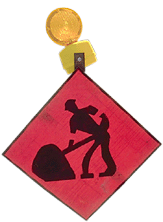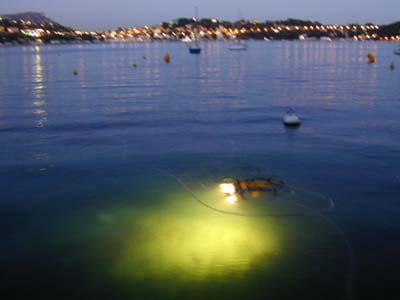|
|
|
-
SAM Project

-
- This project studies the definition of
systems of Navigation and Perception for autonomous systems without
access to external information on their position (for example,
measurements GPS), and which operates in unknown environments.
More particularly, the goal is to give to mobile robots the capacity
to operate without losing itself in unknown environments at the
beginning, and that without having to proceed as a preliminary
to the installation of reference mark articiels. For that, the
robot owes déveloper, as its mission proceeds, a representation
interns of areas of its workspace which he already visited, and
to use this representation to sail : to plan its future displacements,
and to reposition themselves by recognizing the places visited
previously. The definition of systems with this type of autonomy
requires that the robot can exhiber an active attitude (exploratory),
to guarantee that it acquires a quantity of sufficient information
to guarantee a sour progression towards its operational goals.

The formulated problem is particularly significant in the field
of underwater robotics, where very little is known on the environment,
and where the installation of external systems of positioning
is expensive: installation and callibration for each new site
of mission, asking heavy operational means. We can affirm that
the cost of these systems of support, and the risk to lose the
platform during the mission are the two major factors which return
the systems autonomous excessively expensive compared with traditional
means of intervention, thus slowing down their use for practical
applications. The SAM project adopted like area of reference underwater
robotics. However, the developed techniques of navigation can
also be applied in many other fields such as agriculture, industrial
cleaning, the mine clearance, etc.
The stated problems are studied in the project within a multidisciplinary
framework:
- Signal Processing:
construction, starting from the data coming from all the sensors
installed on the robot, from a simplified, but correct and sufficient
representation, of workspace (problem of coding); to evaluate
correctly the autonomy of the robot at every moment (characterization
of uncertainty); to effectively use acquired information (problem
of fusion of data).
- Optimization : the definition
of strategies for the acquisition of new information, and the
planning of the trajectory of the robot for the effective observation
of a given area, under conditions of strong uncertainty, lead
to problems of multivariable optimization, for which the standard
techniques of optimization are not adapted. The SAM project
studies the application of algorithms of stochastic optimization
(genetic algorithms) to these problems.
- Control
: the project studies the problem of order under
uncertainty (robust order), on all the levels of the architecture
of control: order actuators, generation of plans, controls éxécution.
|

